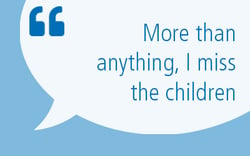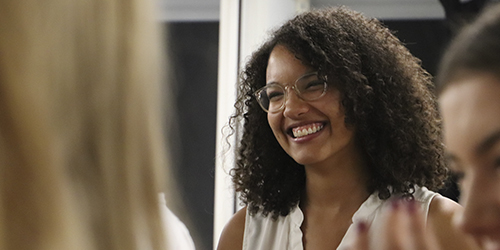When our trainee teachers started in September, they had no idea that they would have to adapt to a whole new way of working halfway through their training year. As well as learning and refining their teaching techniques, they’re now also adjusting to working from home and tuning into training webinars online. So how are they getting on? We caught up with fellow Maths trainees, Momina and Tamara from Walthamstow Academy, and primary trainee Emily from Langford Primary, to see how their working lives have changed.
How has the pandemic affected your daily working life?
Momina: The biggest difference is we’re not at school! Working from home has been a big adjustment, not being able to interact with students as easily as well as with colleagues. However, I still follow the timings of a school day so I am available during school hours to support my students and answer any queries as well as track what work they are completing.
 Tamara: My daily working life has completely changed – I’ve gone from teaching lessons in a classroom, to teaching solely over Google Classroom from my kitchen table. What’s stayed the same are the classes that I look after, wanting to get the best from my students, and the really wonderful relationships I have with my colleagues.
Tamara: My daily working life has completely changed – I’ve gone from teaching lessons in a classroom, to teaching solely over Google Classroom from my kitchen table. What’s stayed the same are the classes that I look after, wanting to get the best from my students, and the really wonderful relationships I have with my colleagues.
Emily: Going ‘online’ and to remote teaching feels very different to what I have become used to and is offering new challenges regarding engagement and supporting those who need it the most, but the school has provisions in place to appease these issues. We are still having regular meetings and CPD. We still have high expectations for the pupils and have tried to establish ‘learning time’ routines for them, which loosely reflect our usual morning timetable.
How are you being supported at this time?
Momina: United Teaching have been excellent on keeping us up to date with any developments and answering any questions we have. Training has continued as live webinars on Friday afternoons which has helped keep the structure of the week. Our headteacher was sending out briefing emails three times a day leading up to schools closing and still sends emails on days we would usually have staff briefings in the morning. My department has been really helpful during this time and we've all been providing support for each other. We still have department meetings on Skype and are kept up to date with any new information via email.
Tamara: United Teaching have been really supportive – they’ve made sure we know that we can contact them with any issues, and provided guidance and information on how we will continue to work towards our QTS. They were very responsive to the situation – quickly changing the format of our formal training sessions to being online, and adjusting the training and related activities to allow us to keep evidencing our development even though we are no longer in the classroom. At my school we receive regular updates from our Headteacher, and my department have been really supportive in sharing good practice and resources, as well as checking in on each other.
Emily: I still have regular communication with my subject, professional and visiting mentors, who have been offering professional help alongside helping us manage the change in circumstances. As well as this, we are having regular group ‘check-ins’ over Skype.
What do you miss about your workdays before the pandemic?
 Momina: The thing I miss most about working from home is being around my students and colleagues. The school day is so full of interactions and not having that everyday can make the day boring at times. I realised how much I rely on my department and fellow trainees to ask for advice or guidance in the office as well as to socialise with at breaks.
Momina: The thing I miss most about working from home is being around my students and colleagues. The school day is so full of interactions and not having that everyday can make the day boring at times. I realised how much I rely on my department and fellow trainees to ask for advice or guidance in the office as well as to socialise with at breaks.
Tamara: I really miss seeing my students, being around my colleagues, and teaching in a classroom!
Emily: More than anything, I miss the children and the face-to-face communication which enables us to support them and their learning so well. I also miss the structure of the school day, and the transition to home working has been a challenge!
What are you doing to protect your wellbeing?
Momina: Taking regular breaks. Without the school bell to remind you what time it is I can get lost doing a task! I like to cook and bake as it relaxes me and takes my mind off work. I also enjoy reading and listening to podcasts in my free time.
Tamara: I’ve been trying to maintain a healthy routine, especially with regards to eating, sleeping, and working hours. I’m making sure I take time to relax, get out to exercise, and keeping regular contact with friends and family, such as by FaceTiming my sister most days, and using the Netflix Party tool to have a weekly film night with some friends.
Emily: At first, I was struggling to balance work and life, especially with the merging of workspace and living space. I have set up a work area, and make sure to have a lunch break in a different area of the house, and at the end of the working day, I don’t revisit my workspace – this makes it easier to separate the two parts of my life! I have made sure to take advantage of the guidance for outdoor exercise, and have also downloaded an app for mindfulness and yoga. Keeping in touch with family and friends through Zoom, Skype and Facetime has also been important.
Any top tips for other trainee teachers at this time?
Momina: Communication is key. My department is constantly emailing each other on what is working well with their classes while working from home. This is a new way of working for both experienced teachers and trainees so ask any questions and don’t stress! I found myself quite anxious in the first week of working from home but if you keep a routine and keep lines of communication open you can avoid a lot of the stress.
 Tamara: Prioritise your mental and physical wellbeing with good routines and non-work related outlets (baking, exercise, Netflix!). Set boundaries in terms of your work and don’t put too much pressure on yourself. Don’t let yourself be isolated - keep regular contact with colleagues, and ask for help if you need it.
Tamara: Prioritise your mental and physical wellbeing with good routines and non-work related outlets (baking, exercise, Netflix!). Set boundaries in terms of your work and don’t put too much pressure on yourself. Don’t let yourself be isolated - keep regular contact with colleagues, and ask for help if you need it.
Emily: Cut yourself some slack! – this situation is new for everyone, and we are all trying to work out the best way to support learners and be the best teachers we can be. Try to remember that this situation is good professional experience – we are learning new ways to engage and support learners, and it’s all things we can continue to use in the future to inform and develop our practice. Don’t be afraid to ask for help – mentors are still there to help and support us, and now more than ever they are bending over backwards to do so. Lastly, make time for yourself – it’s really easy for the hours to blur into one, so set limits for yourself to ensure you maintain time for your life outside of teaching; you can’t pour from an empty cup!
Want to hear more from our trainees? Sign up to one of our upcoming webinars.



